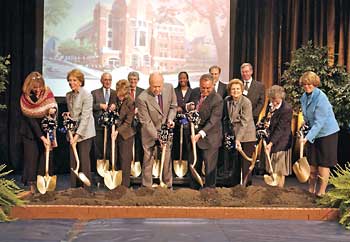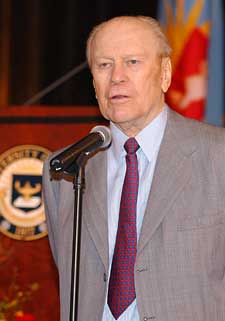|
|
Former President Gerald R. Ford recalls that when he was a U-M student in the 1930s, he used to stroll past the large lot on State and Hill streets that soon will become the new home of the school that bears his name.
“I had to wonder why that was so vacant,” Ford said during a Nov. 12 groundbreaking for the Joan and Sanford Weill Hall that will house the Gerald R. Ford School of Public Policy when the building opens in fall 2006.
More than 400 faculty, donors, students and alumni attended the program at the Indoor Track Building to kick off the construction of the hall and to celebrate the school’s 90th anniversary.
Ford said he and his wife Betty are grateful “for Sanford and Joan’s friendship and their generosity. I thank you both from the bottom of my heart.”

The ceremony was one of several events planned during the two-day celebration, which highlighted the school’s history and growing academic program. The new Weill Hall building will become the southern gateway to Central Campus.
In December 2001, the Board of Regents approved the new building that will house faculty, staff and students from the Ford School in one location. The school currently operates in three buildings, including Lorch Hall, an annex on Huron Street and a converted apartment building on Oakland Street.
“With this building, you have given us the promise of our first true home,” Ford School Dean Rebecca Blank said to donors. “For nine decades, space has been our final frontier as we moved through the University in search of a place to call our own,” Blank said as she briefly highlighted the school’s itinerant history.
Among those in attendance were Betty Ford, sons Jack, Mike and Steve, and daughter Susan. After the program, Steve Ford said the ceremony elicited the same emotion as 10 years ago in October 1994 when the University retired his father’s football jersey number 48—it nearly brought his father to tears.
“This is a big honor for him to come back here,” Steve Ford said.

Citigroup Inc. Chairman Sanford Weill, who contributed $5 million toward the building named in his honor, said he and his wife were grateful for President and Mrs. Ford’s friendship.
“It’s a very emotional day for me,” Joan Weill said, telling the audience how their friendship with the Fords got what she called a “rocky start.” Weill said while visiting the Ford’s vacation home, she used a hair dryer in an outlet not rated for the appliance and she blew all of the fuses in the house, causing an uproar with the Secret Service. Later, she said, the couples enjoyed butter pecan ice cream and good conversation.
Sanford Weill said he and his wife were honored to be a part of Ford’s legacy and to know “the greatest couple we’ve ever met.”
“This school will train people that will really lead this world of ours to be a better place,” he said.
The new five-story, 80,000-square-foot facility will feature classrooms, a library, research centers, a computer laboratory, faculty offices, and public spaces for conferences and lectures.
“This building will be a wonderful tribute to the Fords’ service to our country,” President Mary Sue Coleman said.
Added Provost Paul N. Courant, “President Ford, this school and its graduates will be an enduring testament to your legacy of integrity and skill in public service. I can think of no better role model.”
Ford, 38th president of the United States, received his bachelor of arts degree from the University in 1935. He was a member of Michigan’s national championship football teams in 1932 and 1933, and the campus is home to his presidential library.
Ford’s lifetime of public service includes 25 years in the U.S. House of Representatives. He also was a member of the Presidential Commission investigating the assassination of President John F. Kennedy. He succeeded Spiro T. Agnew as vice president in 1973 and served as president from 1974-77.
The Ford School has grown in prestige and increased operations since it began in 1914. At that time, the Institute of Public Administration (IPA) was one of the first of its kind nationwide.
The IPA reorganized in 1968 as the Institute of Public Policy Studies, with an expanded curriculum to include economic analysis, political analysis and quantitative methods. In 1995, it was given school status within U-M and named the School of Public Policy. The school officially was named after President Ford in 1999.
U.S. News & World Report has ranked the Ford School among the top 10 schools nationwide in public administration/public policy.


